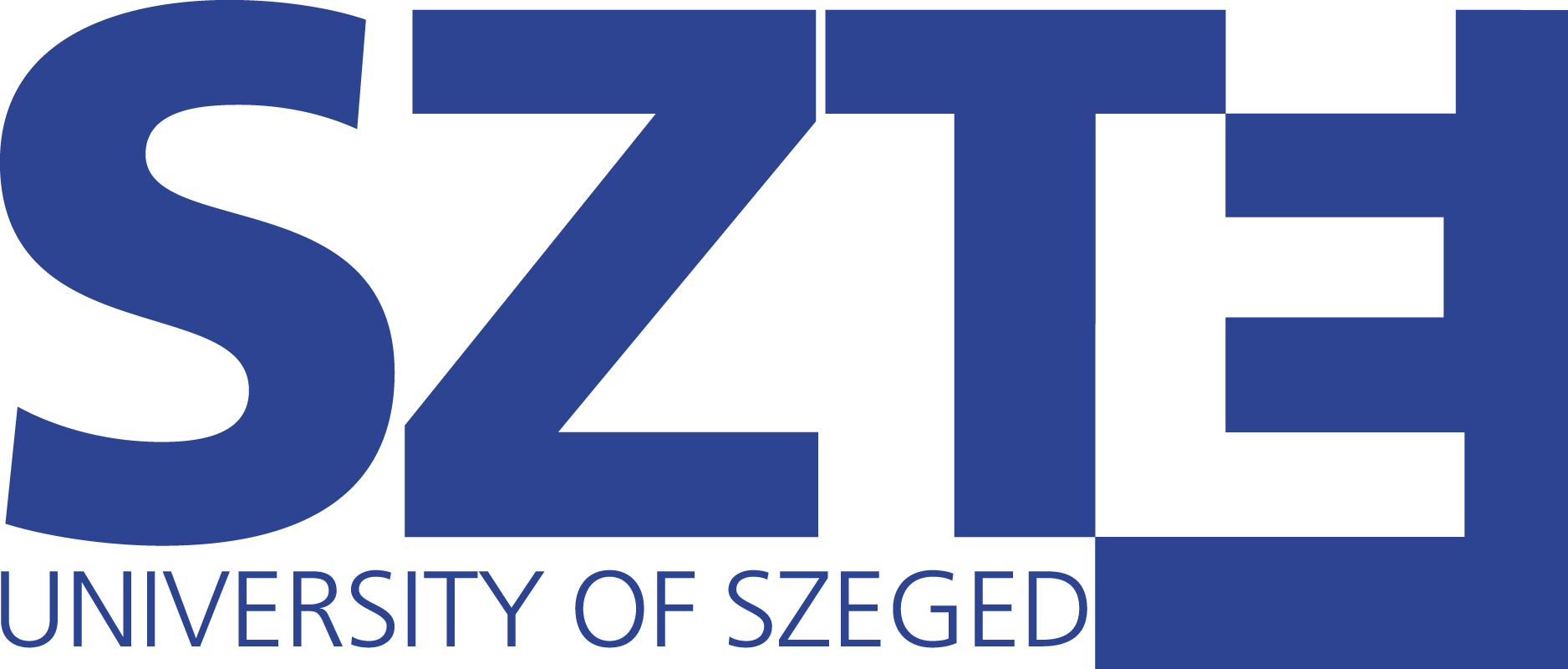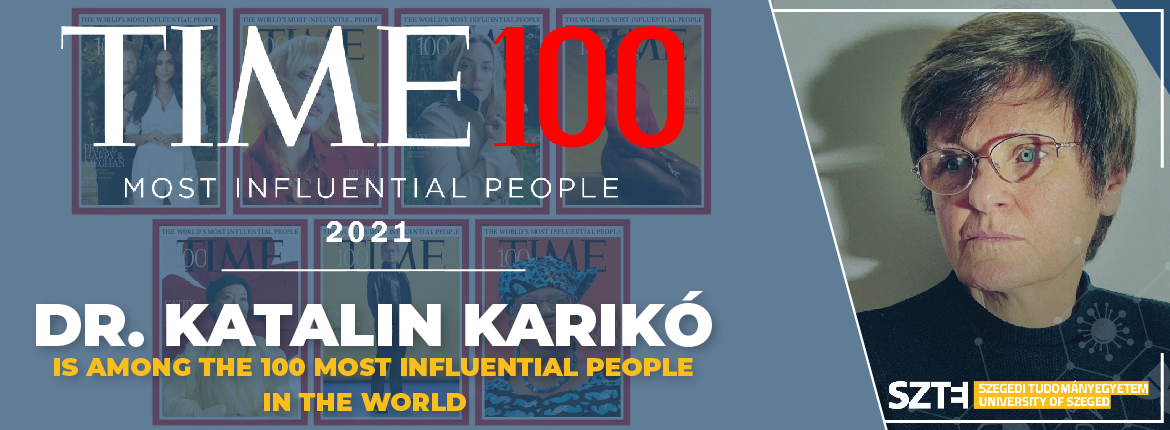
The former student of the University of Szeged is included for the first time in the prestigious Time magazine's list of the 100 most influential people in the world. Katalin Karikó, biochemist, honorary doctor and alumna of SZTE has been included in the 2021 ranking. To commemorate this honour we collected some interesting facts about the "Time 100" list, the 2021 ranking and Katalin Karikó's ‘influencing techniques’.
What is the world like through people and personalities? The Time wishes to answer this question in colourful pictures, reports and interviews. Founded in 1923, the American news magazine has made it its mission to produce a series of "most" rankings. The first compilation of the 100 most influential people of the year was published in 1999. By making the “Time 100” list, the magazine acknowledges that a person has made an impact on the world and has acted to change it, regardless of the consequences of their actions, according to a Wikipedia article. Readers can also vote on the list, selected from a list of names compiled by groups affiliated with the magazine, to decide which of the famous persons should be on the cover.
Honour, but with a ‘short O’
The introduction to the detailed profile of the "Time 100" 2021 list reads, "As biochemist and Nobel laureate Jennifer Doudna writes, all of us who have received" mRNA-based vaccines pay tribute to "Hungarian scientist Katalin Karikó, who for decades defied sceptics by persistently researching mRNA as a tool to fight disease".
The world's most influential people have been ranked in six categories. Katalin Karikó is ranked 4th among the Innovators in the 2021 “Time 100” list.
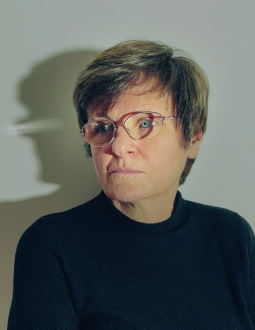
"KARIKÓ", the last sound of the surname that became iconic in 2021, is marked by an unaccented "o" in the pages of Time. But the world-famous biologist has repeatedly claimed that she is a Hungarian scientist, which she also expresses by keeping the ‘long o’ in her surname, the accent that is generally the first thing that people who arrive in English speaking territories ‘lose’ of their identity. It is almost inevitable from the absence of this tiny dash above a single letter that her acknowledgement featured in the “Time 100” does not mention a single word about Katalin Karikó's life before she arrived to the United States in 1985.
Why was Katalin Karikó chosen for the Time 100? Because she is a scientist who started out from Kisújszállás and went on to become a biologist and biochemist at the University of Szeged, "whose dedication over the past three decades helped bring mRNA vaccines to the world". The quotations are from Jennifer Doudna, Nobel Prize-winning professor at the University of California, Berkeley.
She “began studying RNA at a time when it was largely considered uninteresting as a therapeutic molecule." recalled Doudna of Karikó's struggling research.
Why does the nominator admire someone "who is now a senior vice president at BioNTech"? Because of “her dogged pursuit of an idea she was passionate about, and her willingness to collaborate with others.” Katalin Karikó's research "highlights the importance of curiosity-driven science". Her discovery "provides a foundation for new technologies: those early efforts to demonstrate mRNA’s potential would lead to the development of both the Pfizer-BioNTech and Moderna COVID-19 vaccines.”
Why are Jennifer Doudna and millions of people grateful to Katalin Karikó and her collaborators? Because they "pursued ideas that led to a novel technology with the potential to transform future vaccines for infectious diseases as well as autoimmune and other disorders.” Doudna wrote in the last paragraph of her tribute to Katalin Karikó in the Time 100.
Biochemist about another biochemist
What links do the two researchers have besides the laudation? Jennifer Doudna is a biochemist, just like Katalin Karikó, and she was awarded a Nobel Prize, the top honour in the scientific world for her work in co-discovering the CRISPR-Cas9.
CRISPR is an acronym for "clustered regularly interspaced short palindromic repeats", which is the name for short, repetitive stretches of DNA in the bacterial genome, explains Wikipedia. The Cas protein complex was isolated in 2008, 5 types and 16 subtypes have been described. “They are used to detect and destroy DNA from similar bacteriophages during subsequent infections."
The US researcher and her fellow 2020 Chemistry Nobel Prize winner Emmanuelle Charpentier were awarded the prize for their development of the CRISPR-Cas9 'genetic scissor' that allows targeted, highly precise editing of DNA. This means that both Karikó’s and Doudna's work are connected to viruses and DNA. The two researchers are also linked by the vaccine, as both of them received the mRNA-based ‘pioneering vaccine’.
One list, six categories
Time magazine published its 2021 list of the 100 most influential people in the world on 15 September 2021, the 37th birthday of the British Royal Prince and Duke of Sussex, Henry Charles Albert David. The cover of TIMES published two days later on every continent of the world feature photo of Prince Harry and his wife Meghan. The Duke and Duchess came out on top of the Icons category.
American singer-songwriter Billie Eilish came first in the Pioneers category, while American gymnast Simone Biles is the winner of the Titans. The Artists category is led by Oscar-winning British actress Kate Winset and first of the Leaders category is Ngozi Okonjo-Iweala, the Igbo-born Nigerian economist and Director-General of the World Trade Organisation.

The most influential person amongst the Innovators according to Time, is Taiwanese-born Jensen Huang, co-owner of graphics processor manufacturer Nvidia. The second place is taken by South African-born American engineer, entrepreneur, multi-billionaire innovator and the world's richest man, Elon Musk. The last to be featured on the Innovators list is Polish physicist Lidia Morawska, credited with identifying the role of aerosols in the spread of the SARS-CoV-2 virus.
The final sentence of Katalin Karikó’s acknowledgement, which was the fourth among the 14 Innovators, reads. „Katalin inspires us with her creativity, persistence, and commitment to defeating this pandemic and mitigating future health threats.”
Scope of the inspiring Hungarian scientist
The success and recognition that Katalin Karikó's life has lacked during her time in the United States will be in abundance from 2021. The whole world is celebrating the Senior Vice President of BioNTech and Honorary Doctor of Science at the University of Szeged, the scientist who pioneered the discovery of mRNA technology and the vaccine that will help to defeat Covid-19 disease and curb the pandemic of 2020-2021.
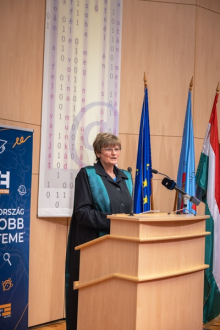
Katalin Karikó was welcomed by prominent figures in the scientific community. Virologist Antony Fauci, Senior Coronavirus Advisor to the US addressed her at the online ceremony of the Rosenstiel Prize. Angela Merkel invited Karikó to the opening ceremony of the WHO International Pandemic Hub in Berlin on 7 September 2021. Dr. Tedros Adhanom, the Ethiopian politician and Director-General of the World Health Organization (WHO) was also present at the ceremony. The German chancellor who has twice been on the “Time 100” list, and similarly to Katalin Karikó is an honorary doctor of the University of Szeged, added to her speech that the career of the Hungarian scientist developing BioNTech and Pfizer's vaccine is impressive.
During her recent visits to Hungary Katalin Karikó met among others, Prime Minister Viktor Orbán as well as other ministers, President of the Academy of Sciences Tamás Freund, the rectors of several higher education institutions - including her alma mater - and many young researchers.
Several of the nearly 50 awards she has received so far include substantial cash prizes. Upon receiving her first cash prize, Katalin Karikó revealed one of her ‘influencing methods’: she spends the sponsors’ gifts from to support talent care and research. She also donates to her former high school and the Csányi Public Foundation to support talented students.
Katalin Karikó also makes an impact on the world through her words. A great example of this is her speech at the opening of the academic year at the University of Szeged. Her three major pieces of advice to young people: focus on personal relationships, believe in yourself, and focus only on the things you can change.
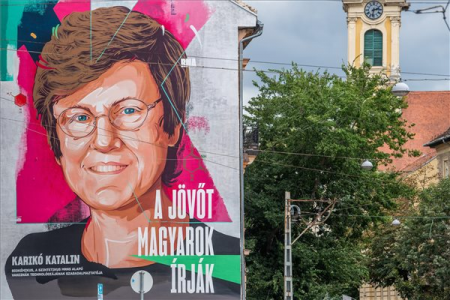
Her popularity is reflected in the fact that several films have been made about her life and work. She dedicates as much time as she can to give interviews to several papers ranging from the major world newspapers to small newspapers of Hungarians living across the border of Hungary. Katalin Karikó's portrait made of Lego blocks is a 21st century message of the new ‘female icon’. A mural was painted in her honour at the Valencia University of Technology, and her five-storey portrait in Budapest proclaims "The future is written by Hungarians". The community of her alma mater is proud that Katalin Karikó, a former student of SZTE, was named by Time magazine as one of the 100 most influential people in the world this year.
SZTEinfo – Ilona Újszászi
Photos by: István Sahin-Tóth, internet
